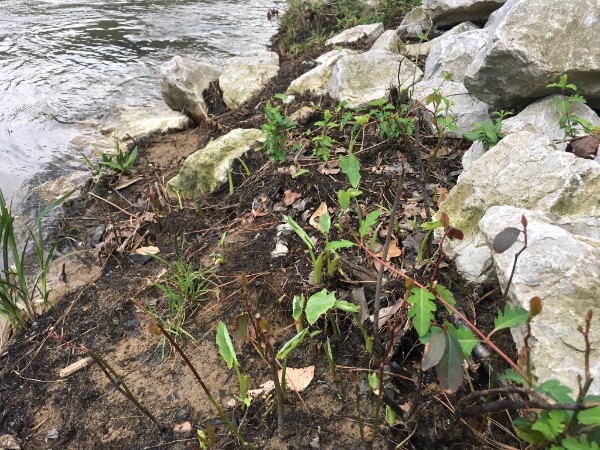
Young taro plants are sprouting on the bank of the Cahaba at the Cahaba National Widlife Refuge in this photo taken in mid-March 2018. Photo by Cahaba River Society Field Director Randy Haddock.
Along with the return of our cherished native plant life, spring has also meant the return of the dreaded invasive taro plant (sometimes called elephant ear) that continues to threaten the Cahaba River, including areas of sensitive Cahaba lily habitat.
Cahaba River Society staff continues to monitor this situation and work closely with partners from the Alabama Cooperative Extension System and the Birmingham Botanical Gardens to create strategies for combating this destructive, invasive plant. We are also working with these partners on a public education campaign to encourage gardeners to avoid its use in landscaping and dispose of existing plants safely. We are currently helping to develop a brochure that will allow us to spread the word more easily about the hazards of this common landscape plant.
Here's what you can do to fight taro:
- Know how to identify taro. Check out the video below for a tutorial.
- Don't plant taro in your yard--especially not in places where it might erode into waterways.
- When disposing of taro plants, ensure that all roots, runners, and tubers are bagged in plastic and sent to a landfill for disposal. Pant pieces left out in loose piles for curbside pick up run the risk of washing into storm drains and then into waterways.
- If you spot taro in the Cahaba or its tributaries, let us know. We are developing a comprehensive map of taro infestations on the River. Contact Dr. Randy Haddock at 205-322-5326 or randyh@cahabariversociety.org to report a sighting.
- Help us spread the word. Share this information with friends, neighbors, and your local garden center and plant nursery. Would you like for us to come speak to your garden club or other civic group? Call us at 205-322-5326 to schedule a presentation.
- Help us remove taro. Are you a hardy soul willing to help us remove taro from the banks of the Cahaba? Contact us at 205-322-5326 to volunteer.